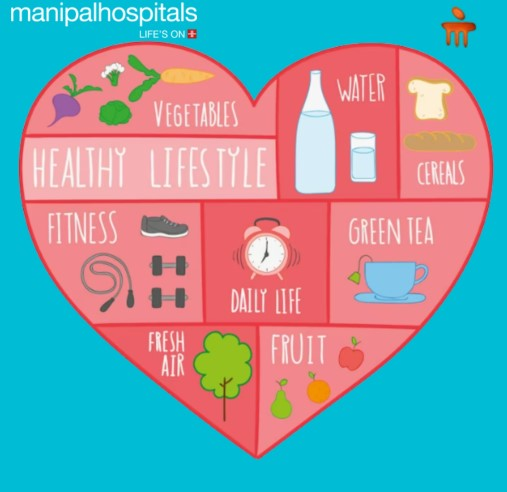
All forms of malnutrition, as well as non-communicable diseases (NCDs) and illnesses, can be avoided by eating a balanced diet throughout an individual's life. Dietary trends have changed nonetheless as a result of lifestyle changes, rapid urbanisation, and the greater production of processed foods. Individuals today consume more meals that are heavy in calories, fats, free sugars, salt, and sodium, and many individuals do not eat enough fruit, vegetables, and other dietary fibre-rich foods like whole grains.
Increased use of processed foods, sedentary lifestyles, and alcohol consumption in urban areas are the main causes of these chronic diseases, whereas, in rural areas, the availability of wholesome food, knowledge of healthy eating, tobacco use, and a lack of health care facilities are problems. Additionally, metabolic risk factors such as obesity, high blood pressure, hyperglycaemia (high blood glucose levels), and hyperlipidaemia (high levels of fat in the blood) boost the risk of various NCDs.
Fortunately, it is possible to avoid these illnesses. The WHO estimates that three lifestyle changes—eating nutritious food, getting more exercise, and quitting smoking—can prevent 80% of heart disease, 80% of diabetes, and 40% of malignancies. As a result, it is imperative and required that children get a strong emphasis on nutrition.

One of the most important preventative steps that individuals can take is to pay attention to what they eat and to consume a range of nutritious meals from different food groups.
Nutrition for managing diabetes:
Nutrition plays an important role in managing diabetes. People with diabetes need to focus on a balanced diet that includes whole grains, lean proteins, healthy fats, and plenty of fruits and vegetables. Regular monitoring of blood sugar levels and working closely with a healthcare team can ensure that nutrition goals are being met and diabetes is being managed effectively. The following are some dietary habits for individuals to manage diabetes:
-
It is recommended by the top dieticians of the nutrition clinic in Kolkata to choose complex carbohydrates such as whole grains, fruits, and vegetables to control the carbohydrate intake. High-fibre diets are recommended because they will be effective in controlling blood sugar levels and encouraging appetite.
-
One should avoid the consumption of excess calories and carbohydrates and concentrate on portion size. Blood sugar levels are kept steady by consuming balanced meals and snacks.
-
One should limit the intake of added sugars and sugary beverages. Instead, intake of natural sweeteners such as stevia or moderate consumption of fruits is recommended.
-
Intake of lean proteins is recommended in a diet that involves poultry, fish, beans, and tofu, which could be effective in maintaining blood sugar levels and promoting hunger satisfaction.
-
Healthy fats such as avocados, nuts, seeds, and olive oil should be added to the diet, which will be effective in managing diabetes and supporting cardiovascular health.
Nutrition for a Healthy Heart to Manage Heart Diseases
Throughout the world, heart disease is the main cause of death. Lowering risk factors and enhancing heart health can be accomplished with a heart-healthy diet.

-
Consumption of fruits, vegetables, whole grains, legumes, and nuts should be prioritized, as these foods contain antioxidants, fibre, and minerals in abundance that promote heart health. Also, read the blog on Healthy foods to eat everyday to know more.
-
Including omega-3 fatty acids such as fatty fish (salmon, mackerel, and sardines), flaxseeds, and walnuts in the diet is recommended as these provide anti-inflammatory omega-3 fatty acids that are beneficial to heart health.
-
Limiting high sodium intake in processed foods and choosing herbs and spices to flavour the meals is recommended. Lowering the sodium intake helps manage blood pressure.
-
Choosing lean protein sources, including skinless poultry, lean cuts of beef, and plant-based proteins, to promote muscular health without too much saturated fat is considered to be the best diet for heart disease.
-
Limiting foods high in saturated and trans fats, such as fried foods and processed snacks, will lower cholesterol levels and support heart health.
Nutrition for Managing Digestive Disorders:
Gastroesophageal reflux disease (GERD) and irritable bowel syndrome (IBS) are two common digestive conditions that can significantly impact daily living. Changing our diet may help reduce the symptoms.
-
Individuals should emphasise the intake of high-fibre foods, including soluble fibre sources like oats, beans, and fruits, for IBS to regulate bowel movements without triggering the symptoms.
-
Adapting to a low-FODMAP (fermentable oligosaccharides, disaccharides, monosaccharides and polyols) diet is recommended as it helps reduce IBS symptoms by reducing the fermentable carbohydrates that may cause intestinal pain.
-
Intake of GERD-friendly foods such as non-acidic fruits, lean meats, whole grains, and non-spicy foods is recommended to reduce acid reflux symptoms.
-
Staying hydrated helps with healthy digestion and avoiding constipation. All-around digestive function is promoted by drinking water throughout the day.
-
Including probiotic-rich foods like yoghurt and kefir is recommended as they will support a healthy gut microbiome, which maintains digestive health.
For expert advice on specific diet charts, consult the dietician in Kolkata at Manipal Hospitals Saltlake today.





















 4 Min Read
4 Min Read





















